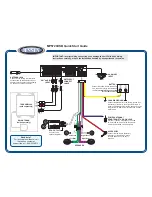
89
Notes on the circuit diagram
a)
If door releases or gate control
systems are fitted and their con-
nected values do not correspond to
12 V AC/DC and min. 20 Ohm, then
either switching output 2 (ATLC ter-
minals 13/14 (output)) or switching
output 3 (ANG terminals 11/12/14
(output)) can be used as a potential-
free door release contact.
To use switching output 2 or 3 as a
potential-free door release contact,
you must configure the corre-
sponding ATLC switching output in
the Access administration interface.
•
The use of the potential-free
switching outputs is described in
separate diagrams.
(For detailed information, see
page
m)
Where there are more than
10 BTM 650-… units, an addi-
tional 12 V AC supply, for instance
TR 603-…, must be installed due to
the current consumption. To use the
additional supply, the jumpers on the
ATLM are removed from b1/c1 to
b/c and the b/c terminals are directly
connected to the additional supply.
The jumpers for the ACM camera
module between the terminals V3/
V4 and the terminals b1/c1 remain
as they are.
•
Supply limits ATLC/NG 670-…
(For detailed information, see
page
• The use of an additional power
supply is described in a separate
diagram.
(For detailed information, see
page
o)
The COM 611-… code lock
module is always available for
making calls (direct dial via numeric
code).
Together with the EC 602-… easikey
controller, additional control func
-
tions (e.g. access control) can be car
-
ried out for this door station.
r)
To ensure smooth operation, the
COM 611-… code lock module and
the EC 600-… easikey controller
must be supplied with their own
power supply.
t)
If only control functions (access
control) are run, the Da/Db terminals
of the COM 611-… and EC 600-…
must be connected directly to one
another (without connection to
D1/D2). Only in this case may the
COM 611-…/ EC 600-… of the var-
ious door stations be interconnected
to a group. If no control functions
are needed, then the COM 611-…
code lock module can also be used
without the EC 600-… easikey
controller.
















































